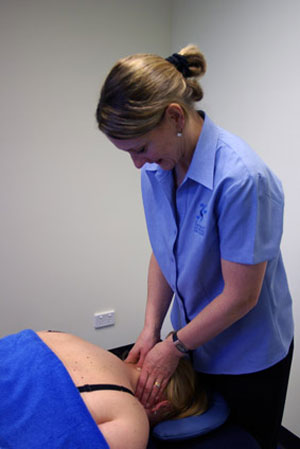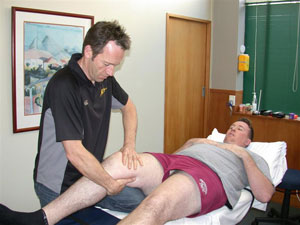Physiotherapist
Tasks & duties

Physiotherapists may do some or all of the following:
-
assess and diagnose patients' injuries or functional problems
-
discuss movement problems with patients
-
observe patients as they carry out specific tasks
-
identify problems and the treatments needed to remedy them
-
use a range of treatments to reduce pain and improve movement
-
plan a range of exercises for patients to improve strength and fitness
-
keep records of patients' progress
-
educate people on the prevention of further injury
-
help improve breathing patterns (cardio-respiratory physiotherapy) and encourage/teach patients to relax
-
work as part of a team of health professionals to improve public health
-
help improve co-ordination, balance, muscle strength and sensation (neurological physiotherapy)
-
help children with disabilities co-ordinate their movements, growth and development
-
help rehabilitate people who have suffered from strokes and accidents
-
educate caregivers, family, and where appropriate, teachers, about the patient's physiotherapy programme
-
work with groups, such as antenatal groups or sports teams, to prevent problems
-
work in occupational health to ensure a safe work environment and assist injured workers return to work
-
run a business if self-employed
Specialisations
Physiotherapists often specialise by doing postgraduate training while working. A career pathway to recognise physiotherapist specialists has been developed.
Specialisations include:
-
working with children with disabilities
-
sports physiotherapy
-
acupuncture
-
hand therapy
-
acute trauma
-
mental health
-
women's health
-
occupational health physiotherapy
-
paediatrics
-
occupational therapy
-
neurorehabilitation (related to the brain and nervous system)
Skills & knowledge

Physiotherapists need to have:
-
knowledge of physiotherapy methods and equipment
-
a detailed knowledge of the biomedical sciences, including anatomy, physiology and pathology
-
an understanding of movement, injuries and disabilities
-
skill in performing mobilisation, exercise, movement retraining, manipulation and massage techniques
-
general knowledge of any medical conditions that may affect the treatment given
-
understanding of medical ethics
-
listening skills and the ability to communicate with a wide variety of people
-
teaching skills
-
observational skills
-
problem-solving skills
-
planning and organisational ability
Entry requirements
To become a physiotherapist you need to have a Bachelor of Health Science majoring in physiotherapy (BHSc) from the AUT University or a Bachelor of Physiotherapy (BPhty) from the University of Otago.
Both courses take four years and consist of a first year studying common health science and three years' studying physiotherapy.
Secondary education
Bursary or NCEA equivalent is required to enter tertiary training. Useful subjects include English, biology, chemistry and physics.
Training on the job
Physiotherapists continue to develop their skills on the job. They also attend postgraduate courses to learn new techniques to update their skills.
Registration
On completion of the four-year physiotherapy degree you must register with the Physiotherapy Board of New Zealand to obtain an Annual Practising Certificate. You are then registered to work as a physiotherapist in New Zealand.
Immigrants with a physiotherapy qualification from a different country must also register with the Physiotherapy Board of New Zealand before they can practise physiotherapy in New Zealand.
Useful experience
Admission to the two schools of physiotherapy is largely based on academic achievement and places are limited.
However, experience working as a nurse aide or physiotherapy assistant is useful, as is any work in the health sector. Occupational health nursing and counselling experience is also helpful.
Video
Physiotherapy and Occupational Therapy
From just a job on you tube
Related courses
Physiotherapy
For more information, please refer to Career Services.
Document Actions
